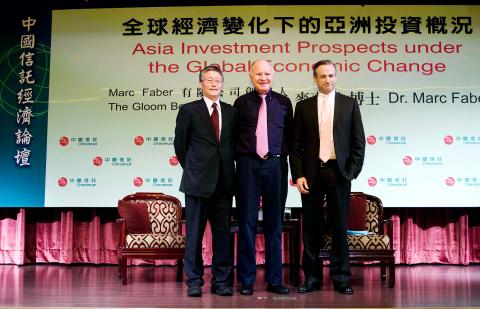Marc Faber, publisher of the Gloom, Boom and Doom report, yesterday reiterated his criticism of money printing practices, which he believes will continue in the US, Europe and elsewhere, causing bubbles such as those seen in the Chinese real-estate market.
“A third wave of quantitative easing by the US Federal Reserve is just a matter of time,” said Faber, a contrarian investor who has been referred to as “Doctor Doom” for a number of years.
Printing money is the way global governments will evade debt crises, such as the one that is gripping Europe, Faber said in Taipei.

Photo: CNA
That would forestall the crisis rather than solve it, keeping prices elevated for assets like stocks, real estate in some areas and precious metal, he said.
Loose monetary policies, including low interest rates, intended as a short-term fix, can have unintended consequences later, Faber said.
While central banks can inject fresh funds into the markets, they cannot control where the funds flow, he said, adding that money printing has encouraged speculation on commodities whose prices have gone up faster than real demand in recent years.
“Some people will benefit from money printing that deflates the purchasing power of currency ... but the middle and lower--income classes are being hurt,” said Faber, an investment adviser focused on value investments, who owns Marc Faber Ltd.
Countries with resources are basking in the trend in light of their sharp increases in international reserves, which Faber said was symptomatic of monetary inflation and a shift in wealth.
The fast-growing economy of China has pushed up its inflationary pressures, with the bubble in the real-estate sector on the brink of bursting, Faber said.
“Don’t believe China’s consumer price index stands only at 5 percent,” he said. “The truth is somewhere between 12 percent and 15 percent ... The real-estate bubble is so evident that Chinese property shares are very weak as the volume of real-estate transactions goes down and prices fall.”
Faber said China would follow the practice of quantitative easing if it has to choose between printing money and a concrete recession.
The Chinese bubble will burst eventually, in three months or in three years; when it happens, it will have devastating consequences for the global economy, he said.
“Chinese invented paper. They know how to print money,” Faber said.
Still, the ongoing shifting balance of economic power from industrialized countries to emerging economies is building up geopolitical tensions, especially in the Middle East and Central Asia, he said.
All the West needs to do to contain China is seize control of oil supplies, but China and the countries dependent on oil imports would not allow that for the sake of self-preservation, Faber said.
He recommended risk diversification against the current backdrop, but took a dim view of government bond purchases as they would mean trust in the easy monetary policy.
Rather, he suggests owning physical gold, equities and Asian real estate that will prove a better defense against inflation.
Greece, Faber said, is bankrupt whether Europe likes to admit it or not, and the European Central Bank will print money to postpone a systematic failure.

The US dollar was trading at NT$29.7 at 10am today on the Taipei Foreign Exchange, as the New Taiwan dollar gained NT$1.364 from the previous close last week. The NT dollar continued to rise today, after surging 3.07 percent on Friday. After opening at NT$30.91, the NT dollar gained more than NT$1 in just 15 minutes, briefly passing the NT$30 mark. Before the US Department of the Treasury's semi-annual currency report came out, expectations that the NT dollar would keep rising were already building. The NT dollar on Friday closed at NT$31.064, up by NT$0.953 — a 3.07 percent single-day gain. Today,

‘SHORT TERM’: The local currency would likely remain strong in the near term, driven by anticipated US trade pressure, capital inflows and expectations of a US Fed rate cut The US dollar is expected to fall below NT$30 in the near term, as traders anticipate increased pressure from Washington for Taiwan to allow the New Taiwan dollar to appreciate, Cathay United Bank (國泰世華銀行) chief economist Lin Chi-chao (林啟超) said. Following a sharp drop in the greenback against the NT dollar on Friday, Lin told the Central News Agency that the local currency is likely to remain strong in the short term, driven in part by market psychology surrounding anticipated US policy pressure. On Friday, the US dollar fell NT$0.953, or 3.07 percent, closing at NT$31.064 — its lowest level since Jan.

The New Taiwan dollar and Taiwanese stocks surged on signs that trade tensions between the world’s top two economies might start easing and as US tech earnings boosted the outlook of the nation’s semiconductor exports. The NT dollar strengthened as much as 3.8 percent versus the US dollar to 30.815, the biggest intraday gain since January 2011, closing at NT$31.064. The benchmark TAIEX jumped 2.73 percent to outperform the region’s equity gauges. Outlook for global trade improved after China said it is assessing possible trade talks with the US, providing a boost for the nation’s currency and shares. As the NT dollar

The Financial Supervisory Commission (FSC) yesterday met with some of the nation’s largest insurance companies as a skyrocketing New Taiwan dollar piles pressure on their hundreds of billions of dollars in US bond investments. The commission has asked some life insurance firms, among the biggest Asian holders of US debt, to discuss how the rapidly strengthening NT dollar has impacted their operations, people familiar with the matter said. The meeting took place as the NT dollar jumped as much as 5 percent yesterday, its biggest intraday gain in more than three decades. The local currency surged as exporters rushed to